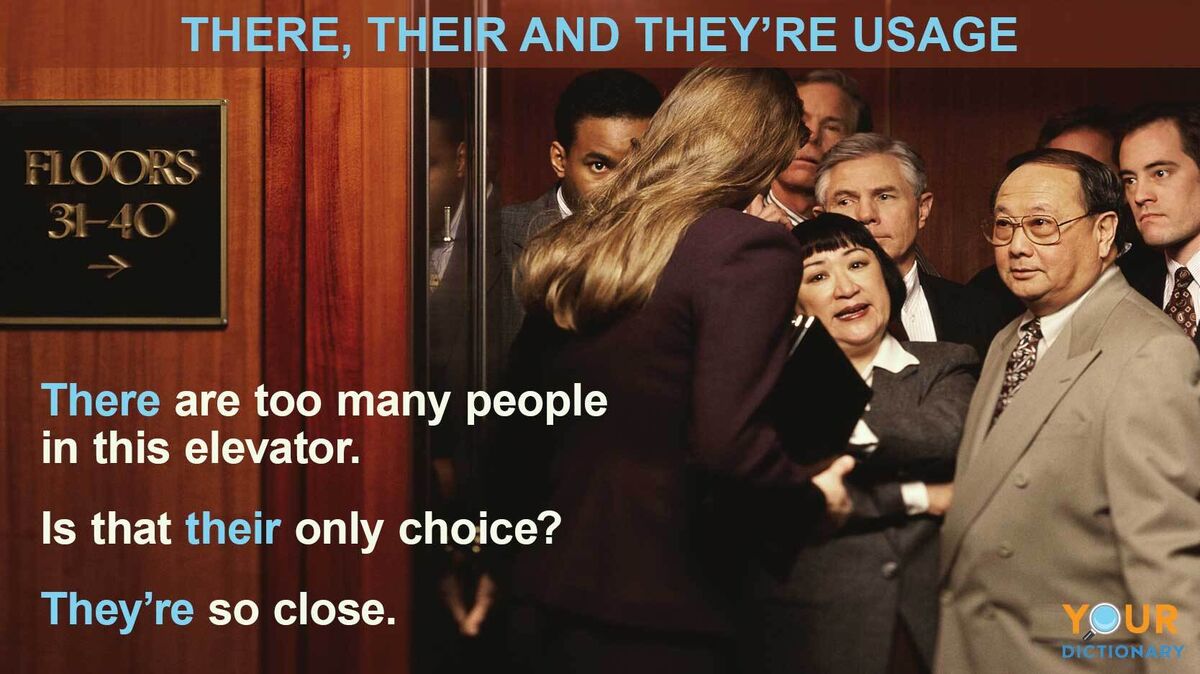
The English language is full of commonly confused words that trip up native speakers and new learners alike. Many sound the same, but have different spellings and meanings, such as "there," "their" and “they’re.” Luckily, the rules for the difference between there and their, as well as the contraction they’re, aren’t difficult to remember. Discover the difference between these words so you never make another slip up again!
Rules for Using There, Their and They’re
Paying attention to the meaning and parts of speech of these three words, as well as common ways they are used in sentences, will help prevent errors when using them in your writing.
Rule #1: There as a Noun
The word there is most commonly used as a noun. In this sense, it refers to a particular place.
- We jogged from way over there to the end of the block, then we sprinted the rest of the way home.
- The child took one look at the haunted house and shrieked, "I am never stepping foot in there!"
- My friend recently visited Ireland and loved it. I can’t wait to go there next year.
Rule #2: There as an Adverb
The term there can also work as an adverb. In this sense, it is used to mean the opposite of the word “here.”
- Do you hear that dog barking over there?
- May I please sit there?
- The officer shouted, "Stop right there!"
Rule #3: There as an Adjective
The word there is sometimes used to modify a noun or pronoun, which means that it functions as an adjective.
- I’ll be there for you no matter what happens.
- The tutor is there to help any time you need assistance.
- Those girls there are the ones who called him a name.
Rule #4: There as a Pronoun
The word there may also be used as a pronoun to introduce a noun or a phrase.
- Is there a desk I can use to do my homework?”
- There are too many people on this elevator.
- Are there any granola bars in the pantry?
Rule #5: Their as a Possessive Adjective
The word their primarily works as a possessive adjective, to describe something that belongs to more than one person. A noun typically follows the word their.
- We walked their dog for them while they were on vacation.
- Their cars were parked on the street while they were having their driveway repaved.
- I offered to babysit their toddler, so they could go out on a date.
Rule #6: They’re is a Contraction.
The word they’re is a contraction formed by combining the words they and are. They’re should only be used in situations where the phrase “they are” could be substituted without changing the meaning of the sentence.
- They’re running late but should arrive soon.
- Did you hear that they’re moving to California?
- I don’t know if they’re planting a garden this year.
Which There Do I Use? (or Their or They’re)
To make sure you’re using the correct word in your writing, keep these tips in mind:
- there - Use the word there to refer to a particular place or to indicate a general location. It can be a noun, pronoun, adverb or adjective. It never shows possession. (I thought I left my book in there.)
- their - The word their is always a possessive adjective. It is used to express possession, meaning that it indicates who something belongs to. (I am looking forward to seeing their new house.)
- they’re - To discuss what people or things are doing, use they’re. The word they’re is always a contraction of they and are. (They’re moving on Sunday.)
Why Are There, Their and They’re So Similar?
There, their and they’re are examples of homophones. Breaking down the word homophone can help you understand its meaning. Homo means "same," and phone means "sound." So, words that are homophones will have the same sound. However, they are not spelled the same and they have different meanings.
Think About the Context
Look out for those confusing homophones! When writing, make sure you slow down enough to pay close attention to how you're spelling words in their context. Remember, the spell check function on your computer may not pick up on misused words like there, their and they’re. Even if they are used in the wrong context, they are technically spelled correctly.
Sharpen Your Skills
Writing deliberately and closely proofreading your work will help you avoid mistakes when using homophones like these. Review these examples of their, there and they’re in sentences to reinforce what you have learned. If you now feel like you've mastered the rules of when to use these words, use this practice exercise worksheet to test your skills.